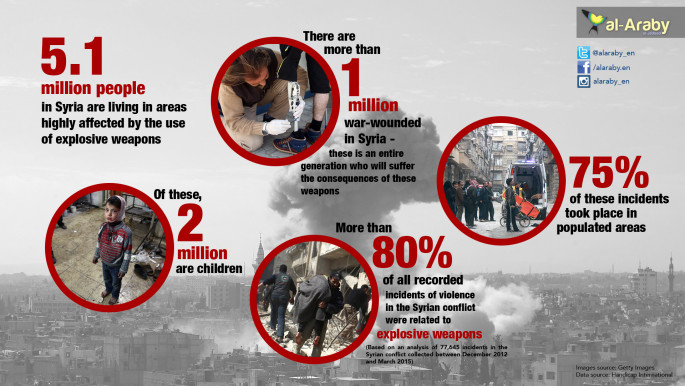
Keeping power in check: this week in human rights
"Now it's public. We got arrested in #Qatar, interrogated by the police and the intelligence service. Not allowed to leave the country for days."
A telling Twitter post from Florian Bauer, a German sports journalist, after he filmed in an industrial city outside of Doha in March.
Bauer and his ARD television crew were in Qatar to follow up on a May 2014 press conference at which Qatari authorities outlined how they intended to improve the living and working conditions of hundreds of thousands of migrant workers.
The team were accused of not having had the necessary permits, although they had spent weeks applying for the necessary licences.
After their arrest and interrogation, they were released and allowed to travel, but only after the intervention by the German ambassador. All of their computers, phones, recording equipment and notebooks were confiscated and all the information wiped.
The Qatari authorities repeatedly claim they are improving the conditions for the legions of migrant workers building the World Cup metropolis but they clearly still have much to hide.
Life on the precipice in Palestine
Some 300 Palestinian men, women and children from the village of Khirbet Susiya are at risk of having their homes demolished at any moment by the Israeli authorities.
Israel’s High Court rejected a petition for an interim order that would freeze the implementation of demolition orders issued against the homes meaning the Civilian Administration, which is of course a military administration, has a green light to clear the Palestinians from their land whenever it pleases.
The village is just north of Hebron in the West Bank and, although it has existed since the 19th century, the residents have been living on a knifes edge since the Israeli settlement of Susiya was established near the village in 1983, on Palestinian land that had been declared state land by Israel.
The fate of the families of Khirbet Susiya reflects the Israeli authoritie's policies in Area C of the occupied Palestinian West Bank, where the military, sorry, civilian administration enjoys near exclusive control.
Israeli settlers in the area have already taken over almost 300 hectares of the villagers’ land and past experience indicates that if the Israeli authorities succeed in expelling the villagers from Khirbet Susiya, either the settlers will directly take over the land or the authorities will take control of it and allocate it to settlers.
A tale of dislocation all too familiar to millions of other Palestinians.
Bombs, bombs and more bombs in Syria
Bombs leave a legacy long after their deadly blasts of fire and steel. Lives shattered by disability and communities littered with unexploded mines are left in their wake.
Swaths of Syria have been set ablaze and reduced to rubble over the past four years by barrel bombs, heavy artillery and improvised missile gas canisters.
 |
|
| Click here to enlarge |
Most of the bombing has been indiscriminate and ordinary civilians have paid an inordinately high price.
This infographic puts this human and physical tragedy into some context.
Silencing the sisters in the UAE
For three months the UAE authorities held in a secret location three sisters and denied their loved ones or lawyers any contact with them.
Asma Khalifa al-Suwaidi, Mariam Khalifa al-Suwaidi and Dr Alyaziyah Khalifa al-Suwaidi went missing after being summoned for questioning in mid-February over their campaigning for the release of their brother who was among 94 pro-democracy activists imprisoned in a sham trial earlier this year.
Accusations of allegiance to the local branch of the Muslim Brotherhood with plans to set up a parrallel government were used as a pretense to push aside any semblance of due process and a fair trial for the 94 defendents.
"The enforced disappearance of these three women is a crime under international law and a shameful act of cruelty," said Said Boumedouha, Amnesty International's Deputy Director for the Middle East and North Africa programme.
After intense lobbying both in the UAE and abroad the sisters were finally released on Friday 15 May.
"It is not yet known what pressure the al-Suwaidi sisters were under while in detention, if they were charged with any offence, or if their release carries any conditions,” said Amnesty's Boumedouha.
Last month, the UAE’s Permanent Representative to the UN proudly declared that the authorities "champion women’s empowerment at every level of [UAE] society".
Just as long as they shut up and tow the official line that is.
'Anti-terror' trumps... just about everything else
Human rights and civil liberty defenders in a number of countries are fighting an armada of 'anti-terror' laws that threaten the freedoms of the people they purport to protect.
A new securyt bill in Tunisia law would criminalize the conduct of journalists, whistleblowers, human rights defenders, and others who criticize the police, and would allow security forces to use deadly force when it is not strictly necessary to protect lives.
Next door in Libya a new counter-terrorism law curtails free speech and rights to peaceful assembly and movement while directly contravening Libya’s obligations under international law and human rights treaties it has ratified.
In Europe too the powers of the security services are being bolstered amid a climate of fear and insecurity. In this blog last week we covered the new law that will see vast new surveillance powers granted to intelligence services in France and the UK is also set to revive and extend the so-called 'snoopers charter' while also passing a staunch new 'counter-terrorism law'.
Round ‘em up and kick ‘em out
A report this week in the Saudi Arabian newspaper Arab News lauded the authorities for having arrested more than 100,000 foreign workers over the past six months, in the city of Jeddah alone.
The wave of arrests is purportedly aimed at curbing crimes such as ‘thefts, sorcery [and] employing illegal workers’.
In the same week Human Rights Watch published a detailed report providing evidence of systemic abuses during the mass expulsion of undocumented workers in Saudi Arabia.
The Saudi Authorities have conducted a concerted campaign since 2013 to detain and deport hundreds of thousands of undocumented workers and the report draws on interviews with 60 workers deported to Yemen and Somalia who experienced serious abuses.
Some workers initially crossed into Suaid Arabia from Yemen but many had entered through legitimate channels but then fled abusive employers and therefor due to the oppressive Kefala system find themselves stripped of their rights.
Many of those expelled are sent back home in destitution having had their personal possessions confiscated, a humiliation on top of the common beatings and time spent in inhumane detention facilities.
None of those interviewed were allowed to challenge their deportations or apply for asylum. Indeed, Saudi Arabia has not established an asylum system under which migrants could prevent their forced return to places where their lives or freedom would be threatened.





 Follow the Middle East's top stories in English at The New Arab on Google News
Follow the Middle East's top stories in English at The New Arab on Google News


